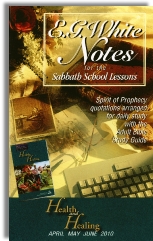|
||||||||||||||
Commentary on "Optimism: Happiness and Healing"
Day 2: Sunday, June 6, 2010 - Depression and Despair
Overview
Today’s study looks at depression and despair in the believer’s life, and how biblical characters dealt with their lowest points. Depression is experienced as a loss of interest, energy, and pleasure in life. Two primary forms are, acute depression that occurs for limited periods in response to external problems, and chronic depression that originates within the individual’s neurochemistry. We are to “avoid judgment and stigmatization” of people with depression.
The biblical examples of Elijah and David are given, who found remedy by hoping in God as their strength. The author concludes that even though depression is unavoidable, we can still make choices “that will help avoid potentially depressing situations.”
Observations
In this discussion about depression, there are critical elements missing. Firstly, how is God involved in the problems that lead to depression? Are they just random events that we react to, along with God, and hope for the best? Or, are they planned for our good, even if we have brought the problems on ourselves? Secondly, how can we have confidence and peace during our deepest depressions, especially when we want to reject God?
In Lamentations 3, we find that Jeremiah could feel no optimism about his future, or the future of Israel. There was no bright side to focus on, for Jerusalem was destroyed, the land was ravaged, and thousands had died. Even the prophet had nothing he could see to give him hope. So he said,
“My soul is bereft of peace; I have forgotten what happiness is; my endurance has perished; so has my hope from the Lord” (Lamentations 3:18).
By all appearances, God had rejected Israel, and for good reason. They had brought this on themselves, and now they were reaping the curses of the covenant. What hope of any blessings from God could Jeremiah have? He cries bitterly, then suddenly in verse 22, we find this glorious confession:
“The steadfast love of the Lord never ceases; his mercies never come to an end; they are new every morning; great is your faithfulness” (Lamentations 3:22,23).
Adventist theology has often stated that Christ died on the cross to preserve our freedom to reject Him, even after He has adopted us. This doctrine is of no comfort to those who are plagued with guilt, feel rejected by God, and who feel like rejecting Him. There are times when our despair is total, when all the remedies have failed, and when the sparkling stars seem to have been wiped clean from our firmament. In our most depressed state, we may convince ourselves that we are hopeless cases, that we have finally decided against eternal life. Therefore He must respect our freedom and let us go.
If you believe that arrangement is “fair” then ask yourself this: if your child became suicidal, would you “respect” her feelings and let her carry out her darkest impulses? No, you would take radical measures to keep her safe! Great would be your faithfulness! Is God less faithful? How much more, then, will the Father hold on to His weakest child. In those dark times we need the strongest kind of Parent to take charge--strong enough to take on our fragile minds as His problem. Like Jacob, we will have to wrestle in the night and cling to our Assailant, demanding that He bless us. And He will.
“Then he said, “Let me go, for the day has broken.” But Jacob said, “I will not let you go unless you bless me.” And he said to him, “What is your name?” And he said, “Jacob.” Then he said, “Your name shall no longer be called Jacob, but Israel, for you have striven with God and with men, and have prevailed” (Genesis 32:26-28).
Jacob’s first blessing occurred when the Man overpowered and wounded him so that he would stop relying on himself. All Jacob’s scheming ceased when he clung to Him in desperate submission. By clinging to God in our weakest state, we can have power with God and man.
Conclusions
- During times of depression, we need to know the Source of our confidence.
- Like Jeremiah, we can hold on to God’s never ending mercy and faithfulness, even when we see no evidence of it.
- Christ did not die to give His adopted children the “privilege” of rejecting Him.
- When we are depressed and wanting to reject Him, we can cling to His promises to hold on to us forever.
- Like Jacob, we can expect God to wound us so that we will submit and cling to Him. Then we will have power over God and man.
Copyright 2010 BibleStudiesForAdventists.com. All rights reserved. Revised May 28, 2010. This website is published by Life Assurance Ministries, Glendale, Arizona, USA, the publisher of Proclamation! Magazine. Contact email: BibleStudiesForAdventists@gmail.com.
The Sabbath School Bible Study Guide and the corresponding E.G. White Notes are published by Pacific Press Publishing Association, which is owned and operated by the Seventh-day Adventist church. The current quarter's editions are pictured above.
Official Adventist Resources
Standard Edition Study Guide Week 11
Teacher's Edition Study Guide Week 11
Easy Reading Edition Study Guide Wk 11
Search the Complete Published Ellen G. White Writings


